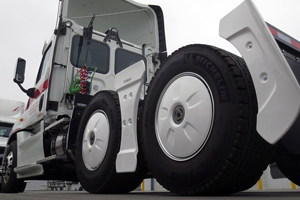Indian River Transport and FlowBelow Aero Begin Equipment Deal

Austin, Texas-based FlowBelow Aero Inc., a manufacturer of tractor-mounted aerodynamic products, announced it has partnered with tank truck carrier Indian River Transport to equip its tractors with the company’s new fuel saving AeroKit system. No terms of the arrangement were disclosed.
The AeroKit includes quick-release wheel covers and a pair of tandem fairings installed on the tractor that work together as a complete aerodynamic system to address the complex airflow around the exposed rear wheels of the tractor.
"We have already begun an aggressive installation program with the assistance of FlowBelow at each of our three terminals,” said Mark Gressett, who is safety director at Indian River Transport.
Indian River Transport, which is based in Winter Haven, Florida, said it operates 650 trucks and 800 food grade tank trailers across the United States, Mexico and Canada. The company primarily hauls fruit juice and dairy products.
The patented AeroKit system reduces aerodynamic drag and improves fuel efficiency of the tractor by 2.23% based on SAE J1321 third-party testing using EPA's SmartWay guidelines, the company said.
“We tested the AeroKit in our fleet for over seven months, starting in January specifically to test the product’s winter durability and performance,” Gressett said. “There are limited options for improving the aerodynamic performance of a tanker trailer, so we were very interested in the AeroKit as a tractor-mounted aerodynamic system. We were impressed with the product’s durability, ease of use, fuel-efficiency performance of over 3% and investment payback in less than one year.”
“Beyond ordering the most aerodynamic and fuel-efficient tractors from the OEMs and controlling driver behavior, routes and fuel stops, there are few options to increase the overall fuel efficiency of a tanker fleet,” said Josh Butler, founder and CEO of FlowBelow. “We are pleased that our Tank Truck AeroKit can play a key role in helping these specialized fleets improve their fuel efficiency and environmental impact.”

